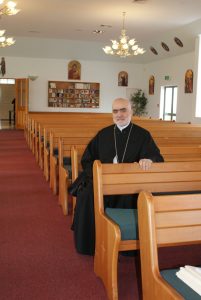by ROWENA OREJANA
Melkite Bishop Robert Rabbat has called on Catholics in New Zealand to pray for and help their brothers and
sisters in the Middle East affected by the worst migrant crisis in history.
Bishop Rabbat came to Auckland on a pastoral visit from October 1 to 4. He also met Auckland Bishop Patrick Dunn, led a retreat for young people and celebrated an interdenominational holy liturgy at St Thomas More Church in Glenfield.
Bishop Rabbat said he was also responding to an invitation from Albishara (The Annunciation), an interdenominational group that brings together the four Eastern Catholic Churches: Melkites, Armenian Church, Syrian Orthodox Church and the Chaldeans.
“A very important topic for our communities challenged by events in the Middle East is, ‘Are we our brother’s
keeper?’ We need to ask ourselves, ‘How can we help?’” he said.
The bishop said there is a lot that communities can do for their brothers in need. “A good group of those who are
here are also migrants and refugees not so long ago,” he said. This shared cultural background can be crucial in helping those who might be lucky enough to come here.
“The first step [in helping] is prayers. As Christians, every step that we are called upon to implement needs to be blessed by guidance from the Holy Spirit,” he said, adding that prayers are a continuous way of replenishing the spirit.
The second step is to raise awareness.
“Being in New Zealand, geography plays a role. You tend to forget there are other refugees. You tend to be orientated to those close to you. The interest might dwindle.”
Bishop Rabbat pointed out that minorities often have to struggle not to be forgotten.
The third step is to organise in groups and work out the practical details of helping those who are being persecuted in their own lands.
“In order to really know what is happening there, ask your religious leaders. Religious leaders are in contact with their counterparts,” he noted.
Bishop Rabbat said there is a great need for housing for those who suddenly find themselves homeless. He said displaced families often live together in one apartment or live in caravans. Those families need financial help to keep a roof over their heads.
The next great need is for medicines. He said that while a house offers stability, medicine will allow the refugees to deal with pain.
The biggest challenge is offering refugees hope. “Giving hope can often be translated as helping children get education. When there is even a rudimentary school, the parents can say there is hope. Their children won’t have a future without education,” Bishop Rabbat explained.
He said the Eastern Church could play a crucial role once the refugees are settled here. “The silent or unseen cultural factors have to be taken in consideration. Hence, the coordination between the Catholic Church, Eastern Churches and the government is important,” he said.
He cited a cultural need for men to be breadwinners. “Men [who do not have jobs] might find that they have lost their dignity,” he said.
“What is really important is for the people of New Zealand not to forget our calling as humans, to reach out to those who are in need,” said Bishop Rabbat.
Christians in the Middle East are paying a big price. “Pope John Paul II said the Church needs two lungs to breathe,” he said as a reminder.
“Most of those being hurt are from Antioch,” a city where St Peter established a Church and became its first bishop. It was also the place where the followers of Christ were first called Christians.
“We should reread our Bible. We’re sister Churches from the beginning,” Bishop Rabbat said.

Reader Interactions